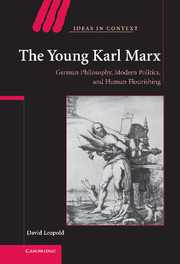Chapter 5 - Epilogue
Published online by Cambridge University Press: 22 September 2009
Summary
Following some preliminary observations about my subject matter (in Chapter 1), the three central chapters of this book have been concerned with what I have referred to, somewhat schematically, as the young Marx's account of the emergence, character, and replacement of the modern state. In Chapter 2, I traced a significant shift in the young Marx's critical interests, away from the extant and anachronistic German polity, towards the modern state whose essential contours he saw reflected in the work of Hegel. Whilst highly critical of Hegel's absolute idealism, Marx was prepared to credit the Philosophie des Rechts with considerable empirical insight into both the structure of the modern social world and the main forms of alienation which disfigured it. In Chapter 3, I sought to show how Marx developed his understanding of political emancipation in the course of a critical engagement with Bauer's antisemitism. Whilst crediting the modern state with an acknowledgement of the value of community (and thereby of an important aspect of human nature), Marx saw its realisation of community as both limited (having a restricted extent) and ‘contradictory’ (as ultimately being shaped and dominated by the defects of civil society). Finally, in Chapter 4, I considered the young Marx's vision of human emancipation – that is, of a world organised so as to make extensive human flourishing possible – by way of an account of Feuerbach.
- Type
- Chapter
- Information
- The Young Karl MarxGerman Philosophy, Modern Politics, and Human Flourishing, pp. 279 - 297Publisher: Cambridge University PressPrint publication year: 2007

